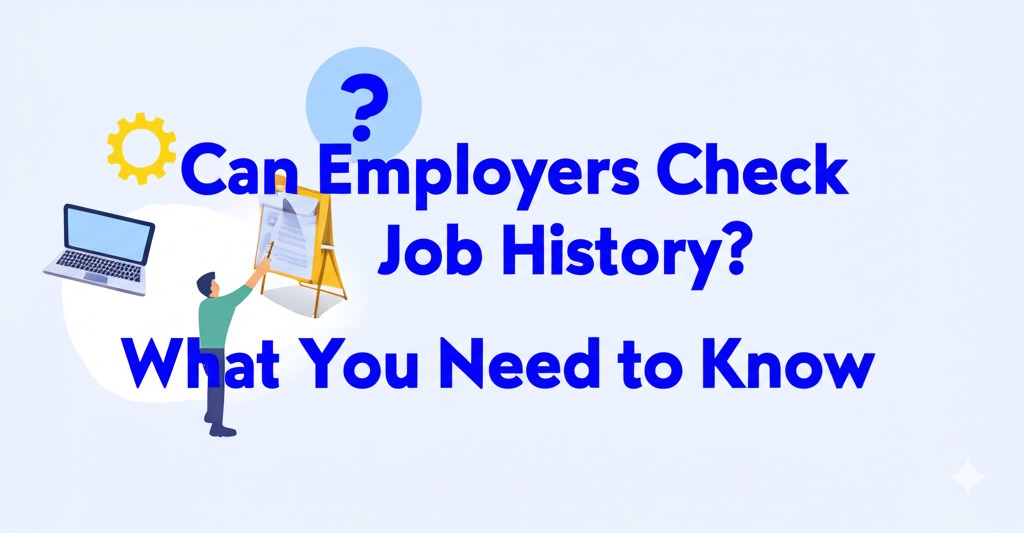
Applying for a new job is exciting, but it also comes with a lot of questions—especially about how much employers can really learn about your past. One of the most common concerns among job seekers is whether potential employers can verify your job history, and if so, how deeply they dig.
In this article, we’ll explore everything you need to know about how and why employers check job history, what information they can access, and how it might impact your job prospects.
Why Employers Check Job History
Building Trust and Verifying Credentials
Employers want to make sure they’re hiring someone who’s qualified, honest, and reliable. Your work history helps paint a picture of your professional background, skills, and overall trustworthiness.
Key reasons employers check job history include:
- Verifying experience and job titles
- Ensuring dates of employment are accurate
- Checking for consistency with your resume
- Identifying gaps or red flags in employment
This verification process is often part of a broader background check conducted before making a final hiring decision.
How Employers Check Job History
1. Contacting Previous Employers
The most common method is contacting past employers directly. This usually involves speaking with HR departments or former managers to confirm:
- Job title
- Employment dates
- Reason for leaving
- Eligibility for rehire (in some cases)
Most companies will only confirm basic information due to legal restrictions and internal policies, especially to avoid potential defamation or privacy issues.
2. Using Background Check Services
Employers may also hire third-party background screening companies to verify job history. These services compile data from multiple sources, which may include:
- Employment records
- Social Security employment history
- Public records and databases
These checks are typically done with your consent, as required by the Fair Credit Reporting Act (FCRA) in the U.S.
What Employers Can (and Can’t) See
What They Can See
- Dates of employment
- Job titles and roles
- Company names
- Reasons for leaving (if shared by previous employer)
In some cases, they may also learn about:
- Performance reviews
- Disciplinary actions
- Salary information (if voluntarily provided by you or disclosed by a reference)
What They Can’t See
- Jobs not listed on your resume (unless discovered through other means)
- Exact job performance unless documented and shared
- Private matters like health history, unless relevant and disclosed
Without your permission, most third-party checks can’t be performed, especially if they involve accessing sensitive data.
Can Employers Find Out If You Lied?
Yes—And It Could Cost You
Falsifying job history is a risky move. Employers are increasingly using background checks to catch resume fraud, including:
- Inflating job titles
- Extending employment dates
- Listing jobs that never existed
If discrepancies are found, the consequences can include:
- Immediate disqualification from the job
- Damage to your professional reputation
- Possible termination if discovered after hire
Honesty is always the best policy. Even if you lack experience in some areas, emphasizing your willingness to learn and transferable skills can be a more effective strategy.
What If You Have Gaps or Short-Term Jobs?
Addressing Concerns Proactively
Employers understand that careers aren’t always linear. Gaps in employment or multiple short-term jobs can raise questions, but transparency and explanation go a long way.
Tips for handling these in your job history:
- Be honest about the reasons (e.g., family care, education, layoffs)
- Use your cover letter or interview to provide context
- Highlight skills or experiences gained during the gap (volunteering, freelancing, courses)
Don’t try to “cover up” gaps with fake jobs—it’s not worth the risk.
How Far Back Do Employers Check?
It Varies by Company and Industry
There’s no one-size-fits-all rule, but here are some general guidelines:
- Standard checks go back 7-10 years
- Federal positions or high-security roles may require deeper checks
- Senior-level roles may involve a more extensive review of your full career
If you’re concerned about older roles or early career mistakes, they may not come up unless they’re particularly relevant.
Your Rights as a Job Seeker
You’re Protected by Law
In many countries, especially the U.S., job candidates have rights when it comes to background checks:
- You must be informed if an employer is conducting a background check
- You must give written consent
- You have the right to dispute incorrect information
If a job offer is withdrawn due to something in your background report, the employer must give you a copy of the report and a summary of your rights under the FCRA.
How to Prepare for a Background Check
Be Proactive and Stay Transparent
To make sure your job history check goes smoothly, follow these steps:
- Review your resume for accuracy
- Keep records of employment dates and contact info
- Inform your references they may be contacted
- Be upfront about anything that might raise questions
If you’re unsure what a background check might reveal, consider running one on yourself first using a reputable service.
Final Thoughts: Honesty Builds Opportunities
So, can employers check your job history? Yes—absolutely. But it’s not something to fear if you’ve been honest and transparent throughout your application.
Being upfront about your experience, including any gaps or unusual career paths, shows integrity and maturity. Employers appreciate authenticity more than a “perfect” résumé.

Andre Cuevas provides career insights, job search strategies, and professional advice to help individuals navigate the job market and achieve their career goals.





